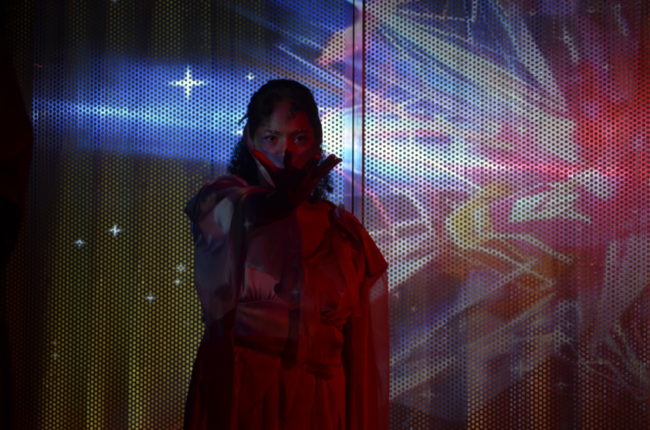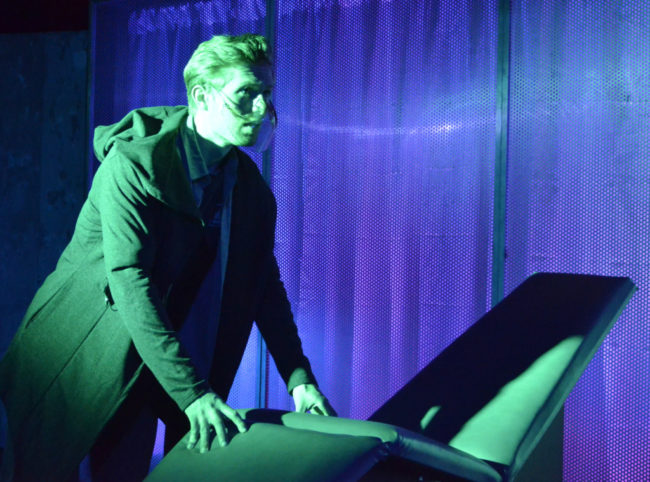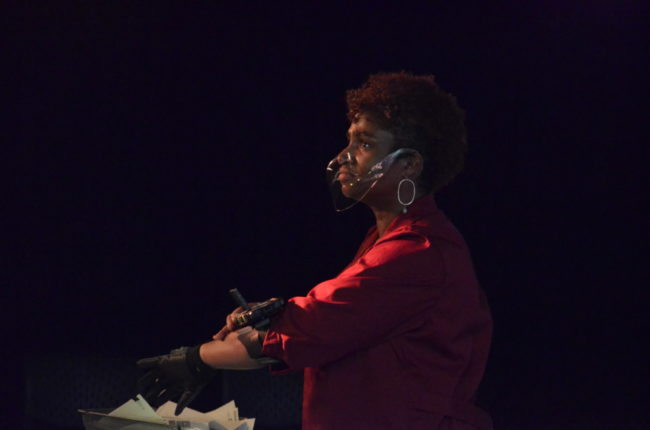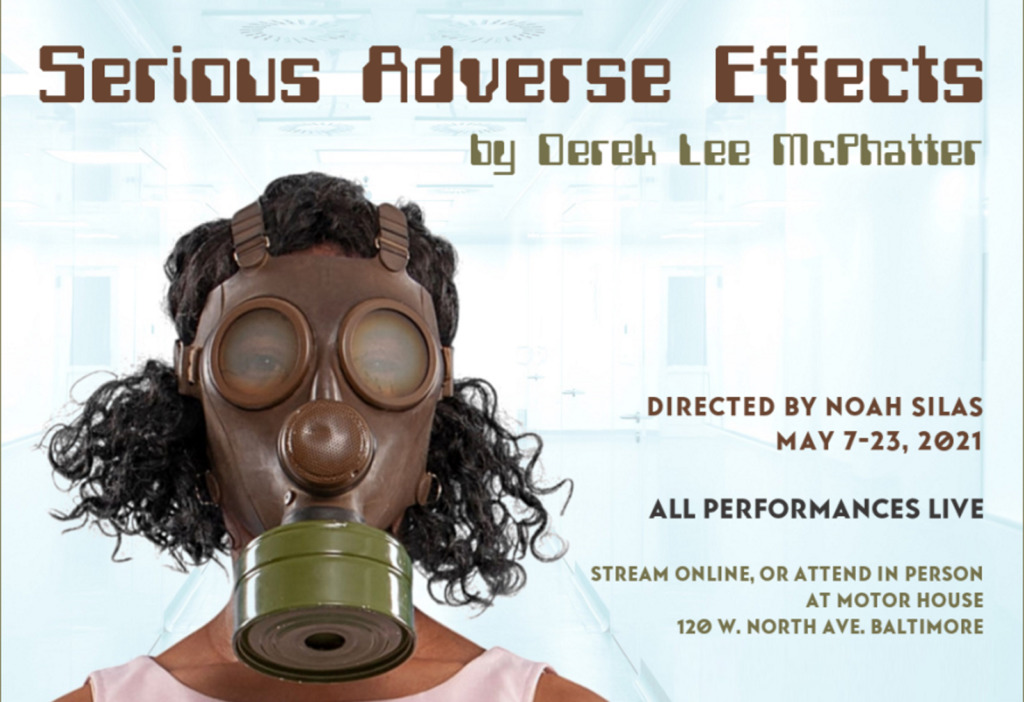Your mind is boundless. Allow this notion to guide you closure to the fullness of you. Or allow Rapid Lemon Productions and their first live on-stage performance of 2021 to guide you to the fullness of you. After over a year’s hiatus from live, in-person, on-stage performances due to the Covid-19 global pandemic, Rapid Lemon Productions is back in action with a world premiere of Serious Adverse Effects by upcoming playwright Derek Lee McPhatter. Directed by Noah Silas, this edgy and poignant play was— believe it or not— both written pre-pandemic (it was workshopped in 2018) and included in Rapid Lemon’s on-stage season before the pandemic put the world on pause. Global events due to the pandemic has made a few of the play’s overarching messages feel that much more relevant and in a sense, eerily prescient.

As it has been quite some time since anyone has been in a theatre for a live performance, there are some things that might easily be forgotten (and no, we’re not talking about cell-phone usage and general theatre etiquette, but also, please remember those things too.) In this case, the play itself presents an enormous ‘ask’ of the audience in regard to suspension of disbelief. Derek Lee McPhatter has fabricated a story that both exists in our modern, or possibly distantly futuristic, world and exists in its own plain of scientifically-influenced magical and spiritual realism. Plays in general do that all the time; personally, having been withdrawn from live theatre for over a year, it was a bit of a shock to see the first show out the gate having such a high demand on the stretches and confines of reality, but McPhatter does find balance in the moments of the work that are fully realistic and those that are more ethereally magic or scientifically spiritual.
The major issue with this work is not that it could be triggering for individuals because of the subject matter (it deals with a whole host of extremely relevant and potent topics, including but not limited to— a severe plague-like contagion referred to as “The Syndrome”, the extreme disparity of health care options for people of color, the way people of color are essentially tricked into clinical trials and treated as less than human, the crushing foot of the white male patriarchy constantly trying to silence the voices of people and women of color in the fields of science and medicine, the struggles of grief and loss due to medical malpractice, etc.) but rather that it is trying to be too many things at once and lacks the cohesive finesse of a well-polished work and well-established playwright to give equal weight and voicing to all of the important notions being presented.
Playwright Derek Lee McPhatter creates this futuristic, neo-science hybrid world that slips into another dimension of sorts during the production. And while McPhatter is presenting crucial elements of society, using the work as a microphone and loudspeaker to draw attention to important topics— like the aforementioned disparity in health care for people of color— there’s just so much happening at once that it all sort of jumbles together and doesn’t give you a clear landing on any one moment or subject. That isn’t to say that a play cannot contain many messages, represent many ideas, or encompass a whole world of issues, just that this play in particular does not quite live up to being able to do so in a clear and concise, digestible and understandable fashion.
What McPhatter does have a brilliant handle on is the construct of the main character, Dr. Vye. McPhatter has created a woman of color in the science and medicine industry who is on the verge of a major breakthrough while simultaneously being unable to forgive herself for her role in the mistreatment and ultimate disaster of clinical trial patients of color regarding the show’s “Syndrome.” The layers built into this character’s arc are impressive and visceral and the dialogue that McPhatter weaves into the character’s narrative allows the audience to comprehend Dr. Vye’s struggle more fully and on multiple levels.
Rapid Lemon Productions, under Director Noah Silas, has created a safe environment for audiences to return to the theatre. The seating is extremely limited, well below city mandated regulations, and the seating is “podded” (two seats together spaced far apart from other seats). The performers wear masks (and the audience does too!) This only becomes a minor issue for the leading performer, Valerie Lewis, at times early in the production. As a person who has had to perform live theatre in clear masks, it is sometimes very difficult— especially in an open space such as Motor House’s main stage— to accurately judge your personal volume level; what you’re hearing reflected back into your own ears from the mask sounds incredibly loud, causing the body to automatically lower your projected volume, when in reality you’re not projecting nearly loud enough to overcome the clear plastic barrier that is keeping you and the audience safe during these unprecedented times. Lewis overcomes this volume barrier by the end of the production, however, and its an understandable challenge of performing in these current times but it is worth noting all the same.

Sound Designer Max Garner has orchestrated a chimerical soundscape, composed of eerily calming noises that bare an unearthly resonance. These semi-diegetic aural bites envelope the audience as much as they do the characters. Garner’s work wraps flawlessly into the projection designs crafted by Director Noah Silas for a truly ‘out-of-body’ consciousness-delving experience. The colors, kaleidoscopic explosions and overall ethereal blend of sight and sound heightens the “pseudo-science-spiritual” element of the production. Garner’s sound design also features a great array of futuristic zaps, beeps, and boops for the ‘computer’, which acts like an unseen omniscient, albeit indifferent, fifth character. The disappointment here is that Garner’s digitized sound bites for the computer are inconsistent. Every computer command given by Dr. Vye does not have a corresponding audio cue. And if this is intentional— the computer is resisting Dr. Vye or it’s all in Dr. Vye’s head— it is not clearly presented as such.
Set Designer Bruce Kapplin has drawn the audience into the science element of the performance; the entirety of the show takes place in Dr. Vye’s secret lab (and in the transcended consciousness of various characters, though that involves sitting in a chair at the stage’s center and the rest is fabricated through the projections of Noah Silas and the soundscape of Max Garner.) Lighting Designer Allan Sean Weeks adds a unique flare to the futuristic feel of the set with the brightly colored and boarding on UV-style lighting specials that brighten and color the cubes, which compose the lab tables and desk spaces. This effect, however, neat though it may be, feels a little superfluous and at times is distracting as there appears to be no real rhyme or reason to why the desks and lab spaces are flashing their neon-UV hues. To Weeks’ credit, however, there are impressive lighting effects that sweep across the stage every time someone enters the chamber and an induction series begins.
With just four performers on stage, the show moves quickly, though the pacing toward the end becomes sluggish and its difficult to tell whether this is the show’s natural “slow-crash-to-conclusion” or if Director Noah Silas just eased up the reigns of pacing and let it slide. Again, not an overly distracting feature, but noteworthy. Maria Marsalis, playing Nia, has beautiful physicality. She’s a shade, or a spirit, a ghost, an other-worldly; it’s difficult to lay a label on this character, but whatever it is she represents— be it memory or person trapped in another dimension— the way she drifts in and out of a scene is striking. And when she executes her rhythmic body contortions to buzzwords near the show’s conclusions, its fascinating and captivating.
Kyla Hammond, playing Paula, shows the audience a great deal of controlled pain and anger. Her character is a survivor of the clinical trials from “The Syndrome.” Putting the Paula character in scenes against Brandon (played by Max Johnson), who serves as Paula’s defensive, albeit clueless to her experience, fiancée, shows the breadth of control that Hammond exhibits over her character’s emotions. Johnson’s anger and fury and fear are delivered at one level— large. And while this is somewhat disappointing to watch, it feels entirely accurate to the way the character has been written, leaving the burden of “static character” on the shoulders of the playwright and not the actor. The Brandon character lacks dimension and understanding but this feels intentional— he is meant to be the ‘outsider’ as the white fiancée, who feels protective of and angry for his black fiancée, but doesn’t actually understand what she went through. (This is more blatantly presented when he dives into the induction chamber after her at a later point in the show.)

Valerie Lewis, as the main focal point of the performance, gives Dr. Vye an authenticity that is both painful and beautiful. Despite her whispered volume for some of the earlier scenes, the frenetic need to “fix things” is palpable in her presentation. The struggle with guilt, the inability to forgive herself, the desperation to make this discovery so that things can be fixed and she can finally reconcile a type of peace inside her own consciousness is strikingly rendered in Lewis’ performance. The curious thing about Lewis’ performance is that a great many of these emotional charges feel as if they should come with bombastic movements, but they don’t. And that’s okay because there is a raw expression of something visceral and real in the way Lewis presents these feelings, making up for these larger-than-life gestures that might accompany such pathos.
Serious Adverse Effects gives the audience a lot to consider; it presents a lot of poignant topics for mental review and creates a great deal of discussion to be had with others once you’ve seen the show. Be open minded, remember to brush-up your “suspension of disbelief” for the theatre, and come prepared to experience and the night will be an engaging one.
Running Time: Approximately 90 minutes with no intermission
Serious Adverse Effects plays through May 23, 2021 with Rapid Lemon Productions and is available for both remote, online viewing as well as live, in-person viewing at Motor House— 120 W. North Avenue in the Station North Arts District of Baltimore, MD. For more information about tickets and viewing options, please click here.

